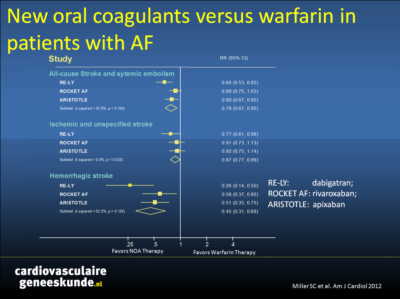Nieuwe orale anticoagulantia vs warfarine bij patiënten met AF
Literatuur - Miller CS et al. Am J Cardiol. 2012 Apr 24
Meta-Analysis of Efficacy and Safety of New Oral Anticoagulants (Dabigatran, Rivaroxaban, Apixaban) Versus Warfarin in Patients With Atrial Fibrillation.
Miller CS, Grandi SM, Shimony A, Filion KB, Eisenberg MJ.
Am J Cardiol. 2012 Apr 24. [Epub ahead of print]
Achtergrond
Het lange-termijn gebruik van nieuwe orale anticoagulantia is geëvalueerd in 3 grote fase III gerandomiseerde placebo-gecontroleerde studies, de Apixaban for Reduction of Stroke and Other Thromboembolic Events in Atrial Fibrillation (ARISTOTLE) studie [1], de Randomized Evaluation of Long-Term Anticoagulation Therapy (RE-LY) studie, [2] en de Rivaroxaban Once Daily Oral Direct Factor Xa Inhibition Compared With Vitamin K Antagonism for Prevention of Stroke and Embolism Trial in Atrial Fibrillation (ROCKET AF)[3]. Deze meta-analyse onderzocht de lange termijn effectiviteit en veiligheid van de nieuwe orale anticoagulantia in vergelijking met warfarine in het voorkomen van een beroerte en systemische embolie bij patiënten met atriumfibrillerenBelangrijkste resultaten
- De nieuwe orale anticoagulantia bleken op zijn minst noninferieur te zijn aan warfarine voor het samengestelde eindpunt van beroerte (met inbegrip van hemorragische beroerte) en systemische embolie (22% RR reductie).
- Alle 3 de middelen waren geassocieerd met een significant verminderd risico voor hemorragische beroerte in vergelijking met warfarine (fig. 1, 55% RR reductie).
- Dabigatran en rivaroxaban bleken vergelijkbare risico's voor ernstige bloedingen als warfarine te hebben, terwijl apixaban superioriteit voor dit resultaat toonde; gastro-intestinale bloedingen waren heterogeen.
- De nieuwe orale anticoagulantia waren elk geassocieerd met een verminderd risico op intracraniële bloeding in vergelijking met warfarine (51% RR reductie).
Conclusie
De nieuwe orale anticoagulantia zijn efficiënter dan warfarine in het voorkomen van een beroerte en systemische embolie bij patiënten met AF, met een gunstig lager risico op intracraniële bloedingen.Referenties
1. Granger CB, Alexander JH, et al. Apixaban versus warfarin in patients with atrial fibrillation. N Engl J Med 2011;365:981–992.2. Connolly SJ, Ezekowitz MD, et al. Dabigatran versus warfarin in patients with atrial fibrillation. N Engl J Med 2009;361:1139 –1151.
3. Patel MR, Mahaffey KW, et al. Rivaroxaban versus warfarin in nonvalvular atrial fibrillation. N Engl J Med 2011; 365:883– 891.


Deel deze pagina met collega's en vrienden: